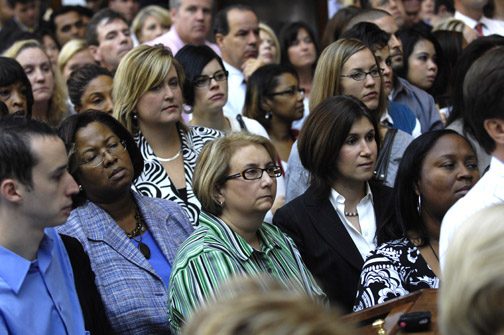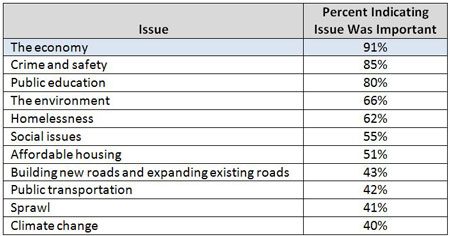Public Pulse: The Charlotte-Mecklenburg Economy

In its last annual survey* which was conducted in late winter of 2010, the UNC Charlotte Urban Institute included a few questions on a variety of issues currently facing the people of Mecklenburg County. Three of the questions directly touched on the state of the economy in Mecklenburg County. This brief report summarizes the findings from the responses to those questions. Obviously, these data are somewhat dated (about six months from the time the information was gathered); however, the needle on the economy has moved little during those six months.
The respondents were asked to rank the importance of eleven issues on a scale of one to five with one indicating the issue was viewed as very important and five indicating that the issue was not very important. The following data array shows the percentage of those responding who thought the issue was either “very important” or “somewhat important.”
Percentage of respondents ranking an issue as “very important” or “somewhat important.”

Not only was the economy the “most important” issue facing this community at the time of the survey, other economy related issues – homelessness, social issues and affordable housing – probably were more elevated in importance than they would normally be during a period of economic expansion. The two other highest ranked issues in terms of importance – crime and safety and public education – historically have been viewed as highly important regardless of the state of the economy. The issue that usually moves up the list in importance when the economy is strong is the environment. At times during the robust economic expansion of the 1990s, the environment often ranked as the most important issue facing our community. The bottom four on this list would almost certainly be ranked higher were there not so much concern about the economy.
A number of demographic questions were also asked on the annual survey. The responses to these questions allow an analysis of variation among demographic groups in their responses to this question about the ranking of the issues. Since this article is about the economy, the demographic variation on that variable will be included here. Essentially, there was no substantial variation among the demographic groups – race, age, marital status, education level, income level, and gender of the respondent had little impact on his or her response about the importance of the economy.
Two other questions about the economy have been used continuously on surveys administered by the Institute for thirty years. One question asked the respondent to judge his or her current economic situation with the same time a year ago: “Compared to this time last year, would you say your current economic situation is better, about the same, or worse?” The second question asked the respondent for his or her perception about the future: “Thinking ahead about your economic situation, do you believe that you will be better off, about the same, or worse off a year from now than you are now?” This is usually viewed as the optimism/pessimism view of the future economic state, not only of the person answering the question but collectively for the total population.
The responses to the question,“Compared to this time last year, would you say your current economic situation is better, about the same, or worse?” are found below.

Based on past experience, the responses would have been much different were the economy in an expansion mode. The “better off” numbers likely would have been above 50%, the “about the same” would have been lower, and one would not have found one-third of the respondents saying that they were worse off. Therefore, these responses clearly reflect the fact that the economy has indeed been in the doldrums.
In terms of demographic groups, those more likely to respond “better off” were whites, those between the ages of 25 and 34, married, college graduates, and those with incomes above $60,000 per year. Conversely those more likely to respond “worse off” were blacks by a narrow margin, those between the ages of 18 and 24 and those from 45 to 64, those widowed, divorced, or never married, those who are not college graduates, and those with lower incomes. Who were the respondents indicating that they were holding their own by responding “about the same?” African-Americans, those 55 and above and particularly those 65 and over, those who are widowed or divorced, college graduates and those with less than a high school education, and those with incomes lower than $20,000 and between $100,000 and $149,999 were somewhat more likely to indicate little change in their economic status over the past year. These data contain few surprises. Those who judged themselves “better off” over the past year were those who, in fact, would respond the same no matter the state of the economy because their opportunities for success are greater. Those worse off tend, in general, to be poorer, less educated, and in a one adult household. Regardless of economic circumstance, these are the folks with less opportunity.
The responses to the question, “Thinking ahead about your economic situation, do you believe that you will be better off, about the same, or worse off a year from now than you are now?” are found below.

These responses are fairly optimistic considering the state of the economy when these questions were asked, and they support the notion that Mecklenburg residents are generally optimistic even in the midst of challenging circumstances. These numbers, in fact, would change some, but not substantially, if we were experiencing a strong economy. The “better off” percentage would be higher, probably in the 50 to 60 percent range with the “about the same” category having somewhat fewer, probably in the 30 to 40 percent range, and the “worse off” response showing little change.
Demographically, those more likely to believe that they would be “better off” a year from the time the question was asked were African-Americans, those between 18 and 24 and 35 and 44, those never married, those with less than a high school education, and those with incomes between $40,000 and $59,999. On the “worse off” dimension, there was little variation – those from age 45 through 65 and over and those either widowed or divorced were slightly more likely to believe that their economic situation would be poorer over the next year. Among those more likely to see themselves about the same a year from the time the responses were given were whites, those aged 65 and over, those with graduate work, and those with incomes of $20,000 to $39,999 and of $100,000 to $149,999. In summary, those most “optimistic” were the young, and those most “pessimistic” were the older respondents. That finding is not surprising – optimism is often associated with being young. A troubling thought about these data – one that has been pointed out in the national media – is that if the economic performance continues to be subdued over a long period of time, will the enthusiasm of the young diminish.
In conclusion, the information from the latest annual survey conducted by the UNC Charlotte Urban Institute clearly shows that the attention of the Charlotte-Mecklenburg community has been focused on the economy. The data from the question about one’s economic situation as compared to a year ago reflect the damaging blow that the local economy suffered over the last year, with just over one-fifth of the population saying that they were better off now than a year ago. However, the responses to the question about the future of the economy portray the inherent optimism of the people of this county, with about two-fifths believing that they will be better off over the next year, a fairly amazing number considering the depths of the recession and accompanying economic downturn. The most troubling thought about this situation is at what point in this continuing downturn might this optimism be replaced by a more pessimistic outlook.
The Institute will be revisiting these questions in the 2011 Annual Survey, to be conducted in April 2011. Comparing the 2011 and 2010 survey responses should provide us with an interesting look at the residual effects of the delayed economic recovery, and whether that delay has finally begun to test the traditional resiliency and optimism that has long characterized Mecklenburg’s citizens.
Photo by Nancy Pierce
For more information about the 2011 Charlotte-Mecklenburg Annual Survey, and how your organization/agency might participate in it, go to Annual Survey.
*This survey was conducted in 2010 between February 15 and March 15. The sample size was 400 Mecklenburg County residents, randomly selected using a listed-sample, with a margin of error of ±5 percent at the 95 percent confidence level.